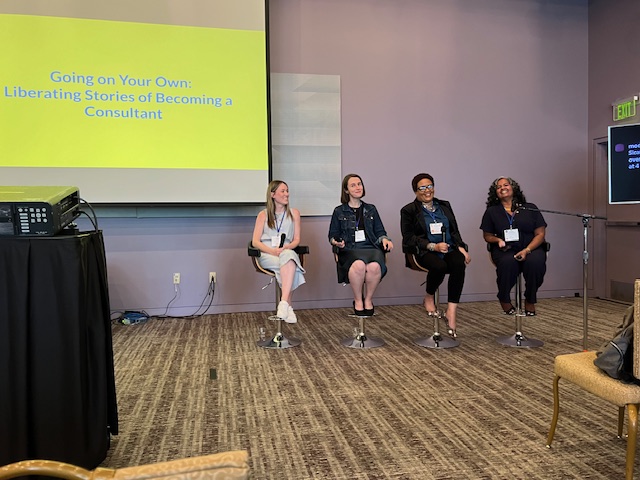- Home
- About Us
- The Team / Contact Us
- Books and Resources
- Privacy Policy
- Nonprofit Employer of Choice Award

There’s no shortage of chatter about the rise of nonprofit consultants. But not enough are talking about the jobs they leave behind — or what the surge reveals about women’s labour in our sector.
When I started consulting five years ago, there were fewer of us around. Now it feels like someone new is making the leap from nonprofit worker to consultant every week.
 I had the chance to explore this shift while speaking on a panel at last year’s AFP Advancement Northwest Annual Conference, titled “Liberating Stories of Becoming a Consultant.” It forced all of us in the room to confront the questions: Who is being liberated, and from what?
I had the chance to explore this shift while speaking on a panel at last year’s AFP Advancement Northwest Annual Conference, titled “Liberating Stories of Becoming a Consultant.” It forced all of us in the room to confront the questions: Who is being liberated, and from what?
While some men are making the transition, in my professional circle, it’s predominantly mid-career women and those facing additional marginalization who are fleeing in-house roles and accepting the risks that come with self-employment.
I don’t think this trend is unique to our sector. But I do think we’re extra vulnerable. At best, even with strong leadership, nonprofits struggle to offer decent pay, benefits, growth opportunities, and work-life balance. Even good workplaces can be vicariously traumatic because of the services they provide. At worst, they can be dysfunctional, hostile, and toxic.
After a decade of in-house work, I left traditional employment even though I was on the cusp of starting a family. Despite losing guaranteed income and employee-paid leave, starting my own consultancy still felt more sustainable than what the sector could offer. I did it to keep doing the work that I was trained for, built my career on, and was raised to believe in, thanks to a mother who worked in social services.
In the US, as I heard from other panellists, I realized the decision to consult could reflect an even starker reality. Without universal healthcare or federal parental leave, American consultants take on expenses and risks that make mine look insignificant. Yet, many are still doing it.
This wave of consulting is a byproduct of precarious labour in our sector — and, I’d argue, it’s an extension of it too. Many millennials like me, who relied on contract work early in our careers, have shifted back to it. That says something about the system.
Hiring consultants can be a smart, strategic choice — one that offers flexibility and expertise when and how they’re needed most. Plenty of organizations have made good use of the rise in experienced, sector-aligned consultants to strengthen capacity, reduce burnout, and manage expenses responsibly. And plenty of folks genuinely thrive as consultants, myself included.
However, our sector’s growing dependence on short-term and contract work raises a bigger (and uncomfortable) question: Does this shift reduce the pressure on nonprofits and funders to fix the very jobs that workers are fleeing for consulting and other sectors?
According to Ontario Nonprofit Network’s 2024 State of the Sector Survey, 42 percent of nonprofits reported they rely on part-time staff or consultants for roles they would like to be full-time. At the same time, more than half said they have open job vacancies, which they attributed to low wages, poor benefits, burnout — and, unsurprisingly, a shrinking talent pool.
Most consultants like me are doing the same work we’ve always done. We bring our skills, lived experience, and insight to vital missions — but forfeit job security for what many can’t find in-house: psychological safety, better (though less predictable) income, and flexibility as working caregivers. Nothing illustrates this trade-off more clearly than workers quitting their jobs and then getting hired back at the same organizations as consultants.
My hope is that one day we won’t need to make this compromise. I want to see a strong nonprofit sector where organizations embody their mission in the workplaces with the same fervour used to realize them in our communities. One where we blend internal and external expertise strategically and offer competitive, sustainable jobs as part of a resilient workforce.
I’m often asked if I’d ever go back to a full-time role, a title, a team. I’ve been offered jobs. Like me, many of the people poised to be the sector’s next generation of leaders only work on contract now. That has real consequences for continuity, leadership, and what comes next. I’ve been told by many that they can’t imagine returning given the way things are.
What would it take to address the conditions that have made consulting a better option for many women in our sector?
Would we still be facing a succession crisis if the mid-career talent currently working in fractional roles returned in-house?
Is the criticism levelled against nonprofit consultants another case of women being damned if we do, damned if we don’t?
I don’t have the answers. But the exodus of women into consulting isn’t just a shift in how we work — it’s a labour reckoning. And we need to start treating it like one.
Kailey Morin is a nonprofit consultant who helps communicators and fundraisers work better together to raise more money. She brings 15 years of in-house, agency, and consulting experience, and cares deeply about the people behind the work. Kailey writes and speaks about nonprofit leadership, collaboration, and the labour issues shaping the sector. She serves on the board of her local trails association and contributes to advocacy as its representative on the BC Nonprofit Network’s Steering Committee. kaileymorin.ca